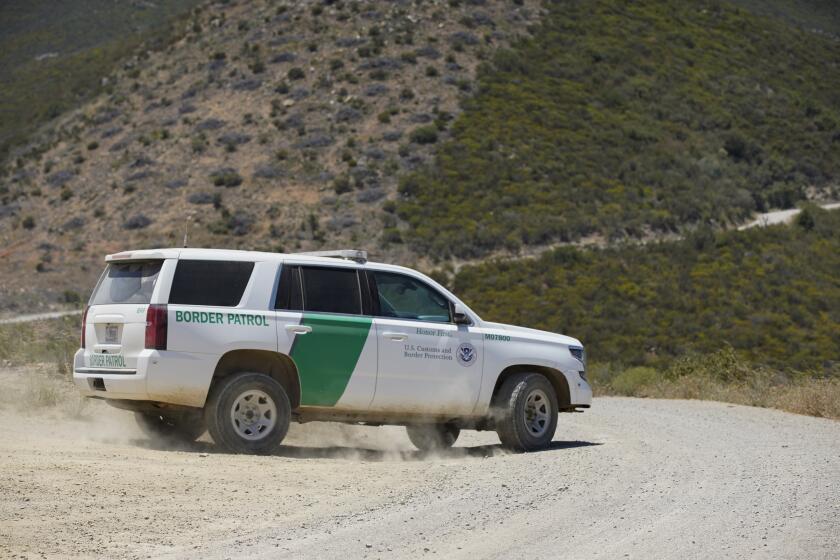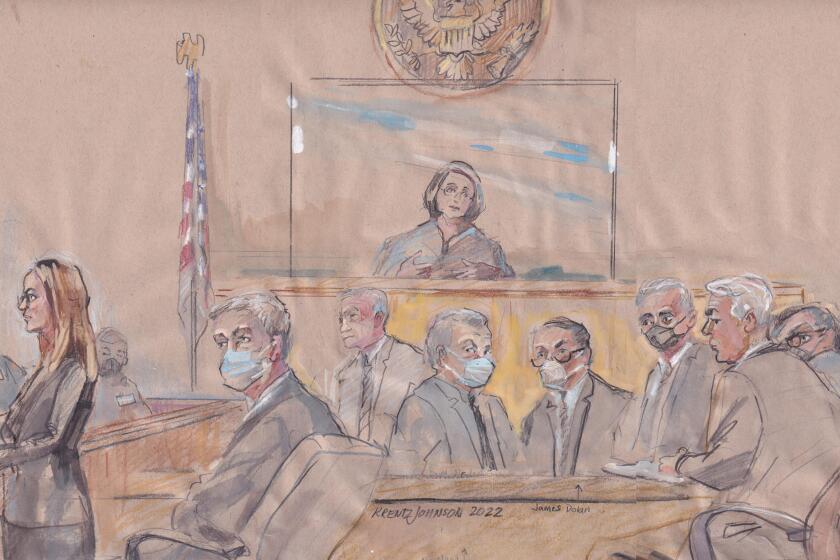Who is drawn to jihad?
People living in the margins. Youths smarting from brushes with the law. Religious converts who, despite their fervor, lack a deep understanding of bedrock teachings.
This is the profile of people drawn to extremist Islamic groups, scholars said.
And while there are still many question marks about 33-year-old Douglas Authur McCain — who last weekend became the first American to die while fighting for the jihadist group Islamic State — some of this profile may be a match.
Friends called him “Toothless.”
Sometimes he stayed in a small, one-bedroom apartment with his mother and sister above a Spring Valley hair salon, neighbors said. One observer said he appeared to carry a handgun holstered on his hip.
It’s unclear what McCain did for a living. An American by birth, he smoked and dressed in what another observer described as not the clothes of a devout Muslim.
“Those who are radicalized in favor of jihad often are also marginalized and have had bad experiences with the police and feel alienated from the community,” said Jessica Stern, a professor at Harvard University’s Kennedy School of Government and author of “Terror in the Name of God.”
Money may even be a factor.
“I was surprised when I got to Pakistan how much money played a role in what I always assumed was a career motivated purely by passion,” Stern said.
McCain was killed during a battle in Syria, according to the Free Syrian Army, a rebel militia fighting President Bashar al-Assad’s government. Members of the group told NBC News that McCain was carrying a U.S. passport and $800.
The Syrian Observatory for Human Rights has reported that Islamic State fighters are being paid salaries of $800 a month.
U.S. officials said they have identified nearly a dozen Americans who have traveled to Syria to fight for Islamic State, according to The New York Times on Friday. And the overall influx of male fighters has now prompted Islamic State to begin recruiting foreign women as jihadist wives.
All told, officials said more than 100 Americans have fought alongside rebel groups in Syria since the civil war began there three years ago.
McCain’s mother and sister haven’t responded to phone calls or a message left at their Spring Valley apartment last week.
On social media and in news reports, his family has expressed disbelief that he was fighting with the notoriously brutal Islamic State, sometimes called ISIS or ISIL, whose calling card is broadcast beheadings and death by firing squad.
McCain’s cousin, Kanyata, told NBC that he seemed to gain a strong faith after “he met some Somalian guys who converted him to be a Muslim.”
What’s known about Douglas McAuthur McCain — whose nickname refers to a missing front tooth — is that he was born in Illinois and attended high school outside Minneapolis.
Minnesota, like San Diego, has a large concentration of Somalian refugees.
In high school, McCain reportedly palled around with classmate Troy Kastigar, who went on to fight and die for the al-Shabab terror group in Somalia in 2009. McCain posted photos of Kastigar on his Facebook page, apparently as a posthumous tribute.
Records show that he had brushes with the law, including misdemeanor charges for theft, marijuana possession and driving without a license.
Later, in San Diego, McCain hung out at the now-defunct Somali restaurant African Spice. He was friends with the family that owned the business and would stand outside smoking and talking, and possibly helped inside, according to an observer.
He also attended San Diego City College, but school officials wouldn’t say when or whether he graduated.
How McCain got from Spring Valley to Syria is probably tied to the extensive social-media campaign waged by Islamic State.
Analysts said the jihadist group has recognized the power of social media as a “force multiplier,” meaning its ability to attract recruits.
While terrorist groups have long used Twitter, Facebook, YouTube and other Internet platforms, Islamic State has distinguished itself by producing slick videos and printed publications in English. They include a magazine called “Dabiq,” which debuted July 5 with a cover article called “The Return of Khalifah.”
Only June 29, the group had declared that it established a caliphate, an Islam-centered government also known as a “khalifah,” across Syria and Iraq.
In these and other marketing materials, Islamic State portrays itself as a haven for Muslims who feel homeless elsewhere, said Lauren Squires, a counter-terrorism analyst at the Institute for Understanding War.
“ISIS is fantastic at harnessing the ability to get in touch with disillusioned, disenfranchised or isolated individuals who are looking for a home,” Squires said.
“They say they are looking for scholars, doctors, engineers and any specialists who can come and augment their state and make it an even better place to live,” she said. “They portray themselves as a group walking around making sure people are living fairly in the caliphate.”
In other postings on social media, young recruits have reportedly offered question-and-answer advice for Westerners looking to sign up, such as what to wear and whether teens are too young to join.
Of course, young people have been drawn to rebellion since antiquity.
Ernest Hemingway and George Orwell participated in the Spanish civil war.
Eli Berman, a UC San Diego professor who studies the economics of terror groups, points out that males in their late teens to early 30s are traditionally a volatile demographic.
For Sunni Muslims in that age range, “you look at Syria or Iraq and see Sunnis being terribly oppressed by a very hostile government,” Berman said. “There’s no lack of cause for a young Sunni to fight for.”
What’s harder to explain, he said, is why they would pick Islamic State.
“Of all the rebel groups one might choose in Syria, ISIS is the most disgusting and greatest abuser of humans,” Berman said.
But that may be exactly the draw for the most extreme personalities, analysts said.
As Berman remarked, “There’s no marketing success like success. And the Islamic State is the group that’s winning.”
The jihadist organization broke from the al-Qaeda franchise in Iraq and then honed its skills fighting in Syria during the past year.
In recent months, it has mowed down the Iraqi army, albeit with little resistance. Taking pivotal towns, including Fallujah and Ramadi, Islamic State fighters seized weapons left behind by the United States.
In the past few weeks, a potential genocide of Christians in northern Iraq and danger to U.S. diplomatic workers prompted the United States to begin air strikes against the militant group.
In retaliation, Islamic State beheaded American journalist James Foley in a video that it has broadcast widely. And it threatened to do the same to other Western hostages.
Those actions may be helping to attract recruits who are seeking the hard-core image, said Christopher Harmer, a senior analyst at the Institute for Understanding War.
“They say, ‘We are best of the best. If you want to be a jihadi, if you want to kill Bashar al-Assad, if you want to kill the Shiites, if you want to kill the pagans and Christians and Jews, we are the best show in town,’” Harmer said.
The leader of Islamic State, Abu Bakr al-Baghdadi, has shown himself to be boundlessly ruthless, which has yielded results for the group’s image, Harmer added.
“He said, ‘I’m not waiting anymore for someone to give me permission to declare the caliphate. I am the caliph. Why? Because I’m willing to chop people’s heads off, take women into sexual slavery and start training 6-year-old kids to be jihadis and suicide bombers,’” he said.
“He’s willing to do what no one else is willing to do.”
Like other young Islamic State converts, McCain declared his allegiance over social media, including tweets such as this one from May 14: “To all my Muslims out there stand strong we will soon be 1 #oneummah#oneflag#oneleader In sha Allah.”
These are the kind of threads that an El Cajon man is trying to police.
Ben Kalasho is an Iraqi Christian and president of the Chaldean American Chamber of Commerce.
About three weeks ago, after a young Muslim from Florida detonated a suicide bomb in the Middle East, Kalasho began scouring Facebook, Twitter and Instagram for pro-Islamic State messages.
With the help of others, he has convinced the online companies to shut down 15 or 16 profiles so far, Kalasho said.
However, Squires of the Institute for Understanding War said Islamic State is adjusting. Its followers are now posting items on Russia-based addresses, which are harder for Americans to influence.
“We’re going to continue to press on and do our part. We want to be an intervention,” Kalasho said. “Had somebody intervened in McCain’s life, maybe he wouldn’t have been down this road.”
Get Essential San Diego, weekday mornings
Get top headlines from the Union-Tribune in your inbox weekday mornings, including top news, local, sports, business, entertainment and opinion.
You may occasionally receive promotional content from the San Diego Union-Tribune.







